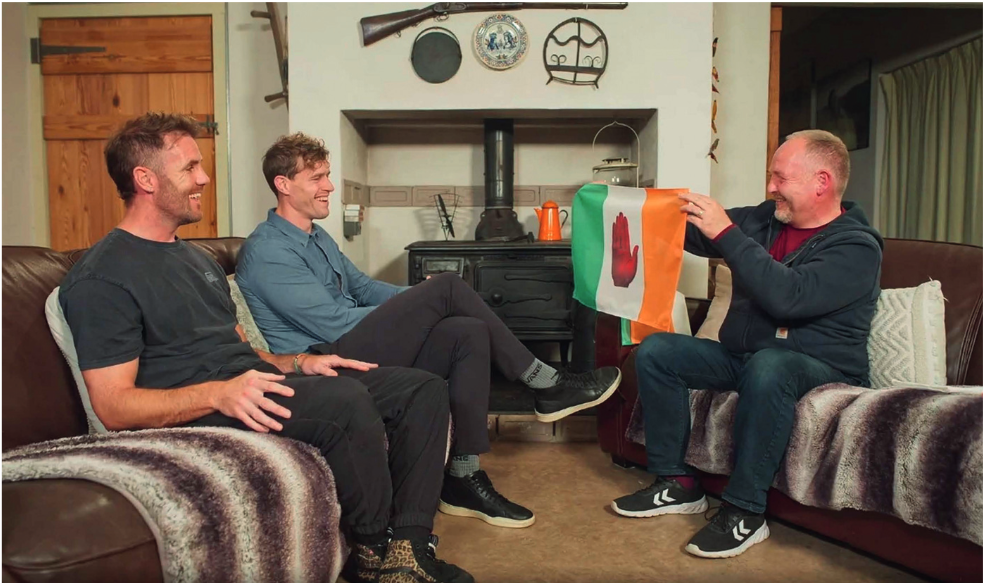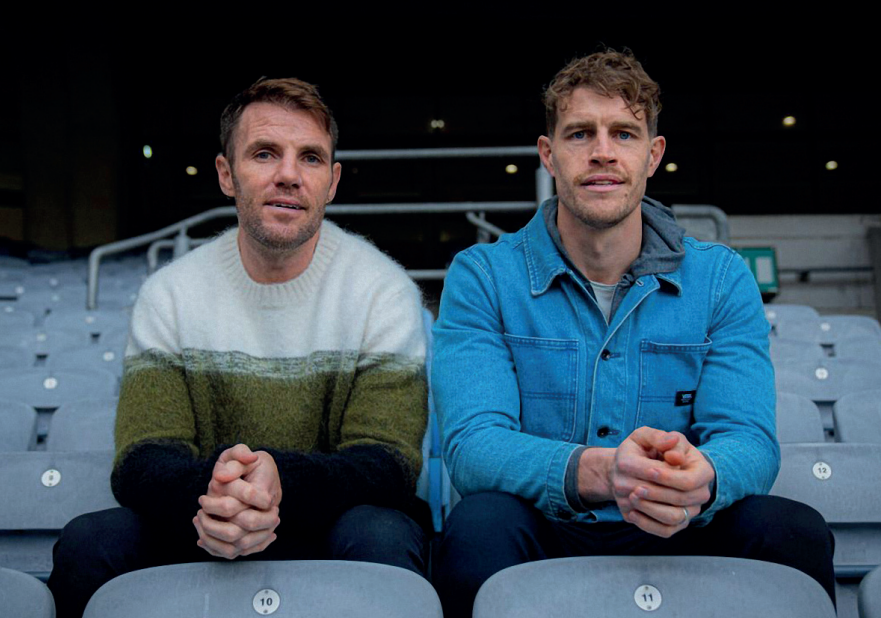RTÉ1, 12 February 2024
NPE Media
By Sylvie Kleinman

A ‘crude binary association’ between religious and national affiliation had ‘crystallised’ during the Troubles; 26 years after the Good Friday Agreement, Coleraine man and former rugby international Andrew Trimble asks whether it is perhaps time to blur those lines again. Given the cross-community and all-Ireland nature of rugby, it is unsurprising that this thought-provoking documentary that he presents has been well received. Congenial, broad-minded and accommodating, he ventures out to explore his Protestant Ulster-Scots heritage in the critical company of his equally congenial buddy Barry Murphy, a Munster man, former player and musician, with whom he hosts the podcast Potholes & Penguins. As their own ‘cultural roots’ are ‘chalk and cheese’, there is much gentle probing throughout of the seemingly conflictual—and, to some, irreconcilable—identities of this island, especially given the fallout from Brexit and evolving trends in Northern Ireland.
The film ends with them chatting in Croke Park, very indirectly touching on the macro-political. They had gone there to reflect on a momentous landmark match that would have been unthinkable even a few years before. In 2007 the GAA had changed its rules to allow the Six Nations Ireland vs England game to be played there. We saw the portraits of the 1920 victims and the pair visiting the GAA Museum, and then in the stands Murphy emotionally recalled being a spectator in 2007. There ‘had to be’ respect when God Save the Queen was played, and there had been. Mind-sets were changing, and for Murphy this significant event in the sporting world had helped pave the way for Queen Elizabeth’s visit in 2011. In a gentle provocation, Trimble reminded him that Irish rugby internationals had formerly been played alternately in Dublin and Belfast, with the British national anthem only played up north. To have earned any of his caps, how would he have felt about first standing for God Save the Queen? Murphy smilingly blurted out, ‘No way, not a hope in hell!’

The rugby anthem had of course calmed this conflict, and alternative flags were not only discussed but gleefully displayed by local historian Mark Thomson in Donaghadee (Co. Down), only twenty miles from Scotland. He candidly referred to the ‘limited thinking’ of ‘two-tribes politics’, which has dominated over the ‘last couple of generations’, though one might add that sectarianism unfortunately goes back much further. He was frank about the use of ‘Catholic and Protestant’ as ‘cosmetic tribal labels’, especially when so few people today were genuine believers or church attenders. For him, ‘Wolfe Tone’ had displayed a much better ‘understanding’ by referring to ‘Protestant, Catholic and Dissenter’. In fact, Tone had only referred to Ireland’s confessional demography in the 1790s to push it forward to a modern vision of a secularised political sphere uniting all Irishmen, as citizens. This was overlooked. Trimble then explained how ‘Tone’s dream of religious harmony’ was represented in Meagher’s original 1848 tricolour. Thomson held up an accurate facsimile, rightly stating that all contemporary descriptions referred to the Red Hand of Ulster in the white centre as the ‘greatest emblem of defiance’. Murphy politely explained that he was lost for words, that it was ‘doing’ something to him, it seemed so ‘otherworldly’. Thomson swiftly moved on to a rarely seen tricolour dating from the tenants’ rights campaign, devoid of white and incorporating a blue band to represent Presbyterians. This reviewer insists that Meagher’s backward association of green with Catholic, because Orange symbolised Protestant, contradicts Tone’s call for a green flag for all Irishmen to rally to, yet the frank discussion and visualisations were welcome.

Loyal band parades were not part of Trimble’s upbringing, and he ‘didn’t really get it’, so he went to his first. There was a family atmosphere and he prompted folk to self-identify from a predictably limited list. Neither of the two interviewees replied ‘Irish’, though Mark Graham, ‘Ulster-Scots’ and ‘British’, was a great rugby fan and had been a ‘proud Ireland man’ when Ireland beat New Zealand. The screen identified him as the ‘Worshipful District Master of the Rathfriland District’, but this was not discussed. Trimble also spoke to Revd Kyle Paisley, a son of Ian, and Mo Hume, daughter of John. On a bench overlooked by Stormont, they offered nuanced views of their respective parents’ religious identities. Mo stressed how social justice had driven her father’s campaigning before nationalism and, in a welcome broadening out of identity, she stated that she was also her mother’s daughter. Especially candid was Vicky, daughter of David Trimble, whose same-sex marriage in Scotland in 2017 had forced her father to reverse his entrenched views on the then ban in Northern Irish legislation. We saw footage of him (painfully) admitting this in the House of Lords in 2019. Vicky was refreshingly frank: while her father had been resolutely ‘British’, she felt a bit Irish, and very Ulster-Scots. But her identity was multi-faceted: ‘Nobody is just a Protestant, or just a lesbian, or just a Catholic’. She really dislikes how ‘some people just love putting themself in a box, or putting somebody else in a box’. It was ‘weird’ that she’d call herself ‘Protestant’, because she wasn’t ‘religious’ and her views could well change over time.
In Cushendall Trimble first crossed the threshold of a hurling club, and his host, Neil McManus, former Antrim hurling captain, spoke candidly. In the 1600s, Scots immigrants had introduced their game of shinty, explaining the locality’s passion for hurling. Most there could identify with Ulster-Scots traditions, yet McManus clearly framed reality. ‘We would be a much better place’ if hurling wasn’t reserved for nationalists nor rugby for unionists, and if children could play the sports they wanted, and be involved in all the cultural experiences from ‘your community and mine’. We heard nothing, however, of attempts to break that pattern. Politics and partisanship are absent in this exploratory and non-confrontational film; while big issues are flagged, they are never challenged. Much of it addresses the self-perceptions of Northern Irelanders, yet Trimble, who does not see difference as ‘a threat’, has started an important conversation.
Sylvie Kleinman is Visiting Research Fellow at the Department of History, Trinity College, Dublin.
